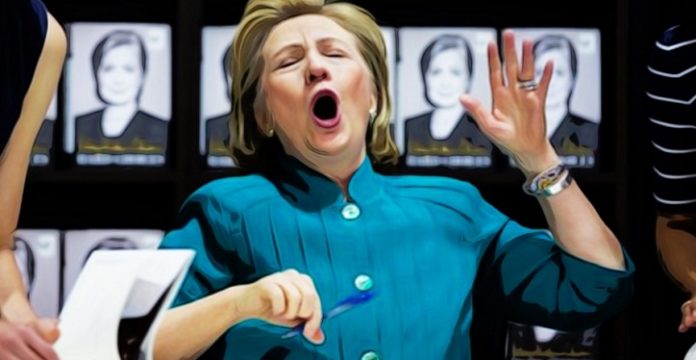
By Clarice Palmer at theantimedia.org
Hillary Clinton, the presumptive Democratic presidential nominee, seems to have prevailed in yet another scuffle with the law.
Days after U.S. Attorney General Loretta Lynch had a meeting with former President Bill Clinton, the Federal Bureau of Investigation (FBI) released a statement from FBI Director James B. Comey claiming that after its investigation, the bureau concluded no formal charges should be brought against Hillary Clinton. The potential charges concerned her illegal use of a personal email system during her tenure as secretary of state under President Barack Obama.
But in the FBI release, Comey also suggested that while Clinton’s actions aren’t worthy of indictment, “this is not to suggest that in similar circumstances, a person who engaged in this activity would face no consequences.”
So what’s different this time?
In July of 2015, the FBI charged Bryan H. Nishimura, a Naval reservist deployed in Afghanistan in 2007 and 2008, for the “unauthorized removal and retention of classified materials.”
Nishimura, who served as a Regional Engineer for the U.S. military in Afghanistan, “had access to classified briefings and digital records that could only be retained and viewed on authorized government computers,” an FBI statement at the time explained. But instead of following protocol, the formal Naval officer “downloaded and stored” sensitive records on his “personal, unclassified electronic devices and storage media.”
From the July 2015 FBI statement:
“He carried such classified materials on his unauthorized media when he traveled off-base in Afghanistan and, ultimately, carried those materials back to the United States at the end of his deployment. In the United States, Nishimura continued to maintain the information on unclassified systems in unauthorized locations, and copied the materials onto at least one additional unauthorized and unclassified system.”
After admitting to Naval personnel he had kept classified documents on his personal digital gadgets and in his home in early 2012, the FBI took notice of the case and opened an investigation to determine whether Nishimura would be indicted. While the “investigation did not reveal evidence that Nishimura intended to distribute classified information to unauthorized personnel … U.S. Magistrate Judge Kendall J. Newman immediately sentenced Nishimura to two years of probation, a $7,500 fine, and forfeiture of personal media containing classified materials.”
The FBI followed Section 793 of the U.S. code when they decided to charge Nishimura. According to the law, “gathering, transmitting or losing defense information” is a crime, whether individuals involved in the incident have the intention of pursuing malicious pursuits with the classified data in hands or not.
One year later, the FBI now claims the rules have changed. Instead of indicting Hillary Clinton for her actions, not her intentions, the FBI now claims she is innocent, effectively rewriting a statute that only Congress has the power to rewrite.
During a justice reform summit in Washington D.C. recently, Texas Public Policy Foundation’s Joe Luppino-Esposito talked about the importance of mens rea, or criminal intent.
Claiming the current criminal code in America requires four different types of mens rea reform, Esposito went on to say that, all too often, Democrats dismiss mens rea altogether when it comes to pushing for investigations into corporations, or for environmental purposes. As a result, the Left’s own “tough on crime agenda” is effectively helping to destroy due process for the individual, forcing us all to be branded as guilty until proven innocent.
But when it comes to statutes that criminalize gross negligence among government officials and employees, as former assistant U.S. attorney for the Southern District of New York Andrew C. McCarthy wrote, the presence of “criminal intent” is irrelevant, mostly because “government officials have a special obligation to safeguard national defense secrets.” Instead of holding a privileged position due to their status, government officials hold greater responsibilities. So when “they fail to carry out that obligation due to gross negligence, they are guilty of serious wrongdoing,” whether the subject of investigation has a “guilty mind” or not.
It’s irrefutable the FBI has ignored its own past cases — and the law — when deciding whether Clinton should be indicted. What’s left to us to answer is why.
We know Hillary Clinton’s husband, the former U.S. president, held a secret meeting with the current U.S. Attorney General, but since we have no access to the contents of this meeting, it is impossible to assert he may have helped to steer Lynch away from an indictment.
Shortly after the Clinton-Lynch meeting, however, Judge Andrew Napolitano claimed:
“It is inconceivable that [Lynch] would permit herself to have any kind of contact with the husband of the target of a criminal investigation. The appearance of impropriety is so profound, no one could accept that she is now neutral in this case.”
According to Glenn Greenwald, the writer who helped Edward Snowden blow the cover on the U.S. government’s unconstitutional surveillance programs, Hillary Clinton had, in fact, malignant intent.
“Using a personal email account and installing a home server always seemed to be designed, at least in part, to control her communications and hide them from FOIA and similar disclosure obligations,” he wrote. So why wasn’t she indicted?
The difference between Clinton and Nishimura, or any other government official involved in similar cases, appears to be privilege.
Hillary Clinton, much like her husband and many other members of the Washington elite, have powerful friends in powerful places.
Instead of the hard-working, honest public servant image she tries to convey, Clinton’s actions over the years paint a very different picture, forcing me to think of her as no different than the leaders of embezzling schemes so common in developing countries. As more accusations regarding her involvement with rich, powerful tyrants hit the news — and connections between her ties to these same tyrants and her work as a secretary of state surface — it’s increasingly hard to see how Clinton could be the president Americans are hoping to see in the White House.
This article (Hillary Non-Indictment Proves Only the Poor and Unconnected Have to Follow Laws) is an opinion editorial (OP-ED). The opinions expressed in this article are the author’s own and do not necessarily represent the views of Anti-Media. You have permission to republish this article under a Creative Commons license with attribution to Clarice Palmer and theAntiMedia.org. Anti-Media Radio airs weeknights at 11 pm Eastern/8 pm Pacific. If you spot a typo, please email the error and name of the article at [email protected].





Hillary Clinton should have sought a decision by a High Court or Supreme Court, just to provide her electorate with a precendence case.